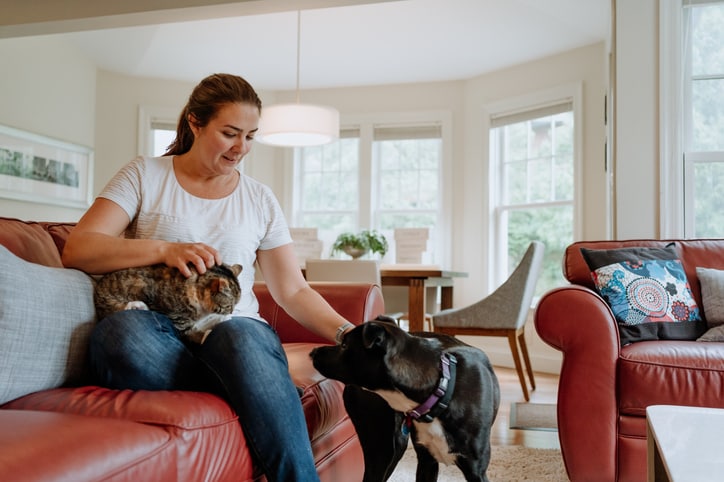Achoo! When the common cold plagues your household, your dog is as bright-eyed and waggy-tailed as ever. Despite their disbelief in personal space, your four-legged family member is unlikely to catch a cold from their favorite humans. However, they can contract upper respiratory infections (URIs) from other dogs.
“While it is rare for dogs to catch colds directly from humans, some viruses like the influenza virus can potentially be transmitted between species,” says Dr. Bethany Hsia, veterinarian and founder of CodaPet. Colds in dogs are similar to common colds in humans: they’re highly contagious, common and usually mild but can sometimes develop into pneumonia.
We asked veterinarians how dogs catch colds, what symptoms to look out for and what to do if your dog comes down with a canine version of the common cold.
Can dogs get colds?
“The likelihood of a dog catching a cold from a human family member is very low compared to transmission among dogs themselves,” Hsia says.
When dogs contract URIs between one another, it may be referred to as “kennel cough.” Canine infectious respiratory disease complex (CIRDC) or kennel cough is similar to a cold in humans. It’s common, highly contagious and caused by a number of viruses and bacteria. The symptoms of kennel cough, too, are very similar to those of a human cold.
Join Care for free
“Apart from kennel cough, there are other communicable upper respiratory infections that can affect dogs,” says Hsia. “Canine influenza, also known as dog flu, is another viral infection that spreads easily among dogs in close contact with each other.”
Upper respiratory symptoms that persist for weeks and then suddenly worsen can point to a mysterious respiratory disease in dogs that’s been on the rise across the United States. As these atypical infections start off with mild symptoms and can quickly become life-threatening, it’s more important than ever to limit your dog’s exposure to canine URIs.
How do dogs get a cold?
Respiratory infections in dogs can spread through close contact via respiratory droplets, which your dog may encounter directly from other dogs or by sharing toys, bedding, and bowls.
“Perhaps 10% of dogs have experienced kennel cough in their lifetime,” says Hsia. “Kennel cough is slightly higher during winters and cold weather, which is similar to the common cold. Also similar is the higher incidences in close quarters, like a dog daycare, which increases contact and virus spread.”
“We can see a rise in cases during the time of the year when dogs who are new or inexperienced to socializing with other dogs are signed up for boarding.”
—Dr. Antje Joslin, veterinarian and veterinary consultant for Dogtopia
“Upper respiratory illness in dogs is not very common in my practice. We occasionally see dogs with URIs, but the majority of cases that we see are in dogs who have recently spent time at the shelter or other rescue organizations,” points out Dr. Antje Joslin, veterinarian and veterinary consultant for Dogtopia.
“Dogs who go to daycare are usually well-vaccinated and have strong immunity from socializing with other dogs,” Joslin adds. “We can see a rise in cases during the time of the year when dogs who are new or inexperienced to socializing with other dogs are signed up for boarding.”
Symptoms of colds in dogs
Symptoms of URIs in dogs are typically similar to those of colds and flus in humans.
According to the Merck Veterinary Manual, the most prominent symptom of kennel cough is a hacking cough that “sounds like a goose honk.” Some dogs also experience other symptoms, such as:
- Discharge from the eyes or nose.
- Sneezing.
- Poor appetite.
- Lethargy.
- Fever.
Symptoms of kennel cough appear five to ten days after exposure. Around five days after symptom onset, most dogs start to feel better, making a full recovery about 10 to 20 days after the first signs of illness.
Though kennel cough and other URIs in dogs are often mild and self-limiting, you should monitor your dog closely for symptoms that worsen or do not improve within a few days, as some dogs develop serious complications like pneumonia.
How to prevent colds in dogs
Find a pet sitter.
Pet parents who wish to limit their dogs’ exposure to canine URIs can opt to use a dog walker or pet sitter instead of doggy daycare or a boarding facility. If your dog goes to daycare or boarding, choose a facility that prioritizes cleanliness and disease control.
“I recommend parents check to make sure their dog’s daycare requires dogs to be healthy and well-vaccinated before coming to daycare or staying in their boarding facilities,” advises Joslin.
“The team at your dog daycare should be well-trained to monitor for symptoms and immediately remove dogs from playgroups who show any signs of a cold and their cleaning procedures should effectively clean and destroy germs,” adds Joslin.
Talk to your veterinarian about vaccinating your dog for kennel cough and canine influenza. Remember to schedule yearly wellness exams and stay up-to-date with vaccine boosters as recommended by your veterinarian.
Along with keeping your dog up to date on vaccinations, Hsia also recommends arming your dog’s immune system against disease with proper nutrition and regular exercise.
When should you see a veterinarian about a respiratory infection?
While kennel cough and other URIs in dogs usually clear up on their own, in some cases, it may be necessary to make an appointment with your vet. “If your dog has green mucus from their nose, loses their appetite, seems lethargic, or has a fever, please take him or her to your veterinarian,” Joslin says.
Make sure your dog gets plenty of rest at home, away from other dogs. You can calm a cough by running a hot shower or using a humidifier. Never use human cold or flu medication unless under the guidance of your vet, as many have ingredients that are fatally toxic to dogs.
Monitor your dog’s symptoms closely and see a veterinarian if they do not start to feel better within a few days. Seek emergency veterinary care if your dog is having trouble breathing or otherwise seems to be in distress.
The bottom line
Dogs may not contract the common cold from their favorite humans, but they can contract URIs like kennel cough from other dogs. Luckily, a dog’s cold symptoms are likely to be mild. “Most of the time a doggy cold will be a minor illness that lasts for a few days,” explains Joslin.
Talk to your veterinarian about vaccinations and other ways to keep your dog healthy.



